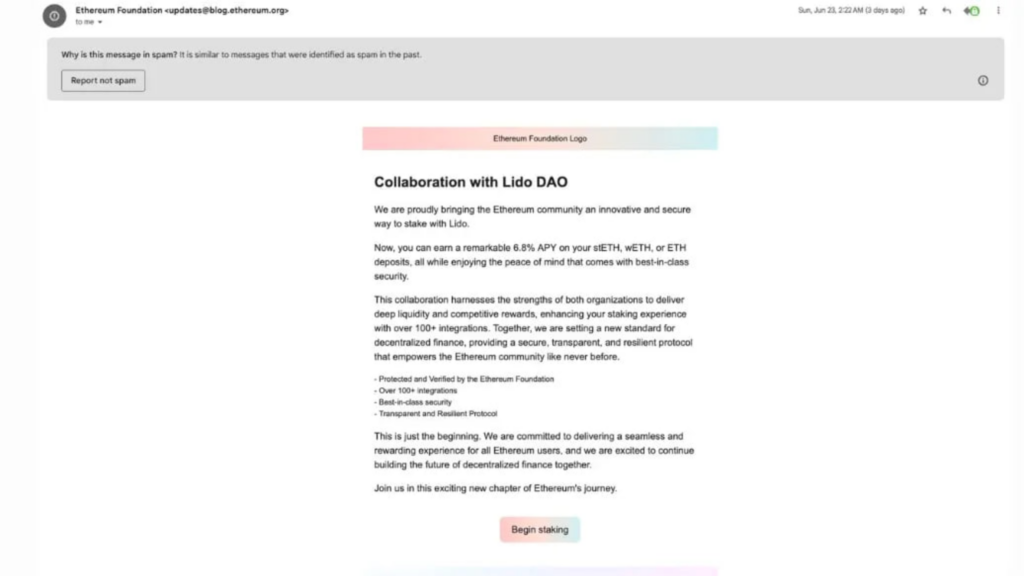The Ethereum Foundation recently revealed that its email account, typically used for official updates, was compromised on June 23rd in a phishing scam targeting Lido staking. Although the foundation swiftly regained control, the incident highlights significant security vulnerabilities within the crypto space. In a detailed blog post, the Ethereum Foundation explained that the phishing emails reached over 35,000 people, including subscribers. Fortunately, no cryptocurrency losses have been reported. However, the email addresses of 81 subscribers might have been compromised.
The fraudulent emails claimed a partnership between the Ethereum Foundation and LidoDAO, promising a tempting 6.8% annual return on staked cryptocurrencies such as Ether, Wrapped Ether, or staked Ether. The scam further asserted that the staking process was “Protected and Verified by The Ethereum Foundation,” a blatant lie designed to deceive recipients. The emails included a malicious link that, when clicked, did not immediately steal the user’s cryptocurrency. Instead, it secretly ran a program in the background aimed at draining the victim’s wallet. Users who connected their crypto wallets to the bogus website and signed the transaction unknowingly authorized the theft of their funds.

The investigation revealed that the attackers used a combination of their own email list and addresses stolen from the Ethereum Foundation’s mailing list. Specifically, 81 email addresses were stolen and used in the attack. This incident underscores the importance of vigilance and robust security measures in the crypto community. Cryptocurrency users are constantly targeted by phishing scams. Security firm SlowMist recently issued a warning about The Open Network (TON), a blockchain built on the Telegram platform, highlighting a surge in phishing attempts that could potentially compromise TON’s decentralized applications and expose millions of users to financial losses.
Despite a rise in phishing attacks, overall cryptocurrency hacks saw a significant decline in June. Data from PeckShield shows that losses dropped to $176 million, a major decrease compared to May’s $385 million. This decline in successful hacks offers a glimmer of hope, suggesting that while phishing attempts are on the rise, broader security measures might be improving. However, the Ethereum Foundation incident serves as a stark reminder that the crypto space remains a lucrative target for cybercriminals. Ensuring the security of email communications and educating users about phishing scams are crucial steps in protecting assets.
For anyone involved in cryptocurrency, staying informed about the latest security threats and practicing cautious online behavior is essential. Always verify the authenticity of emails, especially those promising high returns or requesting wallet access. As the crypto industry continues to grow, so too will the efforts of malicious actors looking to exploit its users. By maintaining robust security practices and remaining vigilant, the community can work together to mitigate these threats and protect their investments.















